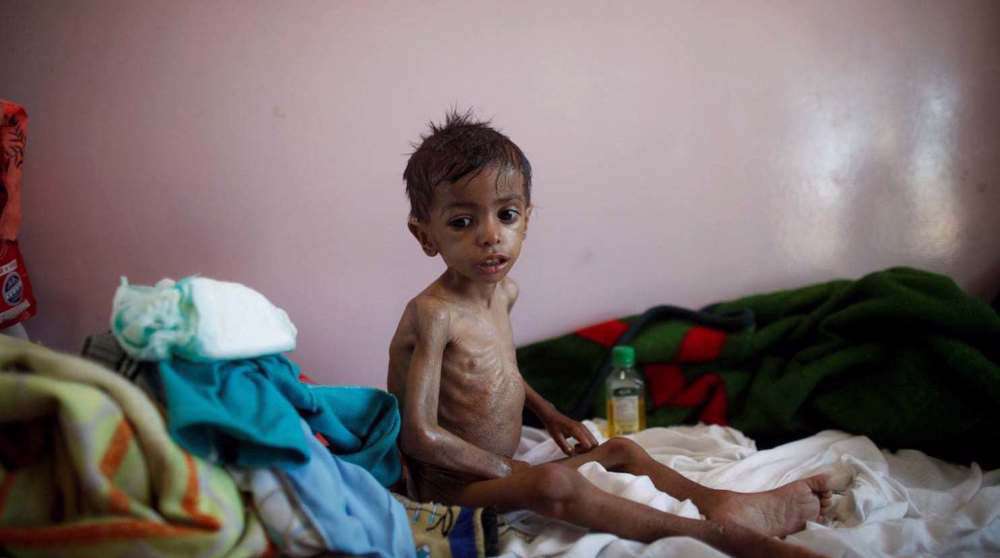The spokesman for Yemen’s Ministry of Public Health and Population says at least one child dies every 5 minutes in the war-torn country, and that nearly half of the health facilities are out of service.
Najeeb al-Qubati on Monday gave a report of the difficulties facing the Yemeni nation in the healthcare and medical system devastated by the Saudi aggression and blockade.
He said that the ongoing Saudi-led military campaign has resulted in the total destruction or partial damage of 527 hospitals.
According to him, that more than 8,000 women die on a yearly basis in Yemen, and more than 2.6 million children suffer from malnutrition.
He noted that 1.5 million people are grappling with chronic diseases, of whom 32,000 need to travel abroad to receive treatment. Moreover, 5,000 patients with renal diseases require kidney transplantation, and the closure of Sana’a airport threatens their lives.
Qubati went on to say that more than 3,000 Yemeni children are born with congenital heart defects, and require treatment abroad.
The senior Yemeni health official pointed out that 500 patients need liver transplantation, and 2,000 others require corneal transplantation.
This comes as the United Nations had pledged to open a humanitarian medical air bridge for Yemeni civilians, who are suffering from conditions which cannot be treated inside Yemen, but no concrete measure has been taken, Qubati highlighted.
He went on to say that Yemen’s National Cancer Center has registered over 72,000 oncology patients, emphasizing the center lacks modern medicine and medical equipment to offer the treatment they need.
The spokesman for the Yemeni health ministry said the Saudi-led blockade has resulted in the shortage of 120 types of medicine for patients suffering from chronic diseases.
The siege has caused an acute shortage of medicine needed for oncology patients, prevented the arrival of new shipments of medicine and medical supplies, and pushed up their prices in the market as a result, Qubati noted.
‘Omani mediation’s success depends on seriousness of Saudi-led coalition’
Separately, a top member of the Supreme Political Council of Yemen has stressed that Oman's mediation to end the war in Yemen depends on the seriousness of the Saudi-led coalition.
“We appreciate Oman's peace efforts, whose success relies on aggressor states and their seriousness to arrive at a viable agreement and compensate the Yemeni nation for the losses that they have sustained,” Mohammad Ali al-Houthi tweeted.
On June 7, the leader of the popular Ansarullah movement met with an official delegation from Oman which is mediating for a face-saving Saudi exit from the Yemen quagmire.
During the meeting in the Yemeni capital Sana’a, Abdul-Malik al-Houthi discussed humanitarian issues and other areas of concern with the Omani delegates, al-Masirah television network reported.
The Ansarullah leader also extended his gratitude to Oman's ruler Sultan Haitham bin Tariq Al Said for his wise positions on Yemen.
Earlier in the day, Mahdi al-Mashat, the president of the Supreme Political Council of Yemen, met with members of the Omani delegation and thanked the Sultanate of Oman for its efforts to alleviate the suffering of the Yemeni people resulting from the Saudi war and siege.
Saudi Arabia, backed by the US and regional allies, launched a devastating war on Yemen in March 2015, with the goal of bringing the government of former Yemeni president Abd Rabbuh Mansur Hadi back to power and crushing popular Ansarullah movement.
Yemeni armed forces and allied Popular Committees have, however, gone from strength to strength against the Saudi-led invaders, and left Riyadh and its allies bogged down in the country.
The Saudi war has left hundreds of thousands of Yemenis dead, and displaced millions more. The war has also destroyed Yemen's infrastructure and spread famine and infectious diseases across the Arab country.

Kaalmimaibi on June 15th, 2021 at 15:11 UTC »
EOS, an aerospace defence (offence) company based in Canberra Australia, are arming the UAE, Saudi, and Israel, and profiteering off all this misery. Their weapons include sentry guns that once switched on can be left to aim and fire at human shaped targets irrespective of whether they are combatants, or non combatants like women and children.
They also have a laser that is being developed to nudge space junk away from their client’s defence satellites.
Remote Weapons System not used in the Yemen war, Australian defence company EOS says - ABC News https://www.abc.net.au/news/2019-07-31/australian-company-eos-denies-weapons-used-in-yemen-war/11368322
Human Rights Watch alarmed at Australian company developing high-tech weapons system in the United Arab Emirates - ABC News https://www.abc.net.au/news/2021-03-10/australia-machine-gun-business-sale-uae-middle-east-human-rights/13220770
https://www.eos-aus.com/space/space-debris-management/
https://youtu.be/Y7B5WvopbiM
Shockling on June 15th, 2021 at 13:10 UTC »
100,000 a year
WildFurball2118 on June 15th, 2021 at 08:56 UTC »
I wonder if Yemen is really forgotten by the world. Feels bad that no one wants to help them, worstly, being ignored because of not-my-problem attitude especially veto-powered countries.